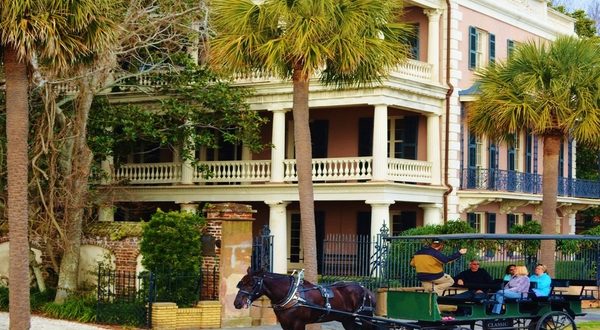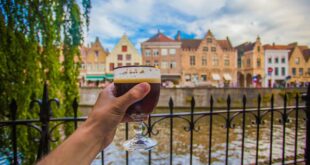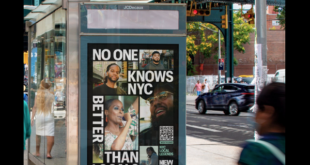[ad_1]
Elegant, charming and enchanting. These are just a few words we’ve used to describe Charleston, South Carolina.
Despite earthquakes, fires, hurricanes and Yankee bombardments, Charleston remains one of the best-preserved and most picturesque cities in America’s Old South.
Simply put, the city oozes with Southern hospitality. From the moment we arrived, it embraced us with a warm, welcoming hug.
It’s no wonder famous authors like Pat Conroy have penned books about this southern belle. Charleston has won its share of accolades, and after one visit here and we know they’re well-deserved.
For those who’ve never fallen under the magical spell of the Queen of the Lowcountry, here are some enticing reasons to go.
Colorful History
Founded by English colonists in 1607, the city played a key role in both the Revolutionary and Civil wars. A replica of the original English settlement can be seen on the grounds of Charles Towne Landing.
Charleston became the symbol of Southern resistance when the first shots of the Civil War were fired at Ft. Sumter. Battery Park, with its cannons, historic statues and stately oaks provides spectacular views of the Charleston Harbor.
Guides dressed in Colonial attire bring history to life at The Old Exchange/Provost Dungeon regaling visitors about pirates and patriots. And we loved touring the historic naval ships at Patriots Point, like the legendary WWII aircraft carrier, the USS Yorktown.
But, what we love most about Charleston is that history abounds here—on its cobblestone streets and markets, in its museums and monuments, and in the bloodline of its native population.
Magnificent Homes and Gardens
Like the song lyrics, “nothing could be finer,” there truly is nothing finer than Charleston’s well-preserved Victorian antebellum architecture.
And there’s no better way to see all these splendid mansions and their perfectly manicured gardens than by taking a horse-drawn carriage tour through the historic district. The extent of classic Georgia, Federal, Greek Revival, Italianate and Victorian period homes is unparalleled anywhere else in America.
Each season, the Historic Charleston Foundation, Festival of Houses and Gardens or the Preservation Society conducts home tours and takes visitors inside these ornate wrought-iron gated and wonderfully-restored masterpieces.
And world-renowned Rainbow Row named for its thirteen pastel, multi-hued 18th-century row houses is a not-to-be-missed iconic site.
Antebellum Plantations
Stately plantations just minutes from downtown Charleston offer glimpses of grandeur from its storied past.
Charleston’s most-visited is the magnificent 17th- century Magnolia Plantation. With its moss-covered oaks and spring-blooming azaleas, the elegant estate is the epitome of the Old South, evoking images of the famous movie, Gone with the Wind.
Boone Hall Plantation, the symbol of southern heritage, is without a doubt America’s most photographed plantation. With its iconic avenue of the oaks, there’s no doubt why this once-thriving cotton plantation was featured in the movie, The Patriot and the North and South mini-series. As we walked the grounds we could only ponder the notion that “if only these trees could talk.”
The sole surviving Ashley River plantation, Drayton Hall, renowned for its rice and cotton production, is a story within itself. This stunning Georgian structure survived Civil War distress and hurricanes. Well-preserved, the home remains true to its original state, as it’s never been renovated or updated.
Churches and Cemeteries
The spires of St. Michaels and St. Phillips were long used by mariners as navigational aids for ships returning to port. Both are now historic landmarks. St. Michaels hails as the oldest church in Charleston. Often called the Holy City, many fascinating historic churches are within walking distance here. Their graveyards, however, yield even more intrigue.
The cemetery of The Circular Congregational Church is reportedly the oldest English burial ground in Charleston with graves dating back to 1695.
Perhaps, the best-kept graveyard secret in Charleston is Magnolia Cemetery. Once a thriving 19th-century rice plantation, this quintessential resting place captures the spirit of Charleston better than any other. “Planters, politicians, military leaders, bootleggers and whorehouse madams are all buried here,” according to Charleston author Ted Phillips.
Arts and Culture
Charleston is home to one of the premier art festivals in America, the Spoleto Festival, held each year from late-May to mid-June. Spoleto features renowned artists and emerging performers in dance, music, opera and theater. But Charleston embraces the fine arts, and musical, cultural and artistic events fill the calendar year-round.
Dock Street Theater, known as America’s first theater, opened in 1736. Victim to fire, hurricanes and disrepair, the magnificent Charleston French Quarter venue with its resplendent grand foyer and superb woodwork underwent a significant restoration in 2010. Today, the theater produces more than 100 performances each season.
No visit to Charleston would be complete without sampling the workmanship of Sweetgrass Basketweavers in the Old City Market. 17th-century West African slaves brought the art of tightly-woven coiled basket weaving to the Lowcountry. Today these baskets made by their Gullah descendants are beautiful, highly prized works of art.
The historic Charleston City Market is by far the city’s most popular attraction. Passionate entrepreneurs sell a wide-range of authentic “made in Charleston” wares here at one of the nation’s oldest public markets. A word of warning, however. No one ever leaves the market without a bag full of purchases. The sprawling four-block retail venue has some of the most beautiful handicrafts we’ve ever seen in any public market anywhere.
Beach Towns
As a seaside destination, metropolitan Charleston boasts five distinctive beach towns.
Isle of Palms, known for its fishing and golf, is bordered by a marina, marsh creeks and beautiful palm trees, not to mention its pristine shoreline. For those looking for a beach town that has it all in one place, this is it.
We call Sullivan’s Island our serene sanctuary when we visit. Peaceful, charming and full of folklore, it’s known for its wide beaches and myriad water sports.
Folly Beach is truly one of the last true American beach towns. This laid-back, family-friendly, funky town is the closest in proximity to downtown Charleston. The beach is popular with surfers and sandcastle builders. Locals love to fish from its magnificent pier, and we love walking its wooden planks to the end for its balmy ocean views.
Kiawah Island is known for its sand dunes and marshes housing sea turtles, alligators, whitetail deer and even bobcats. Its stunning, unspoiled natural beauty is almost indescribable, and if you ask residents they’ll say they intend to keep it this way.
Picture horseback riding along the shore and you’re dreaming the reality of Seabrook Island. With an equestrian center, visitors can guide their mounts along its dazzling beach past moss-draped oaks and fields of sea oats.
Lowcountry Cuisine
A trip to Charleston would be worth it, if only for the food. The city boasts internationally renowned award-winning chefs creating entrees with a harmonious blend of French, Spanish, African and Caribbean influence.
Words like bespoke, sustainable, heirloom and grass-fed dominate the menus. Yet, Charleston remains true to its Lowcountry heritage with tried-and-true favorites we love like She Crab Soup and Shrimp and Grits.
Innovative, trend-setting dishes can be enjoyed throughout the city at uniquely-named venues like SNOB (Slightly North of Broad), Husk, FIG and Swig & Swine.
And for after-dinner drinks, Charleston’s rooftop bars like Market Pavilion offer unparalleled breathtaking views of the bridges and twinkling city lights.
Heralded as “America’s Friendliest City,” Charleston embodies the true spirit of Southern hospitality and charm with its history, beauty and incredible food. The porches are welcoming and life is good.
[ad_2]You can read more of the news on source
 Travelsmart
Travelsmart



